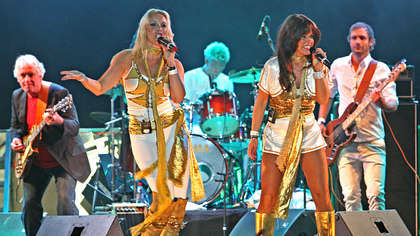
![]()
According to the Official Charts Company, ABBA Gold has sold over 5.61 million copies in the UK, with a worldwide total of over 30 million sales. In terms of sales, only Queen's Greatest Hits has had more success in the UK.
The album debuted at number one on its release in September 1992, sparking a revival of interest in the music of the iconic Swedish group. Its release was provoked by the success of Erasure's ABBA-esque EP, a collection of four covers of ABBA tracks by the British synth-pop duo.
The compilation is one of nine ABBA albums to claim a number one on the UK chart. In total it has spent eight weeks on the top spot while maintaining a presence in the top 100 for three decades. On this week's chart, ABBA Gold sits at number 17.
"It not only highlights their incredible popularity, but just how closely they have connected with a succession of new generations," said Martin Talbot, CEO of the Official Charts Company.
The albums currently closest to repeating ABBA Gold's milestone are Bob Marley and the Wailers' Legend with 984 weeks, and Queen's Greatest Hits with 952 weeks on the chart.
ABBA Gold has been rereleased several times over the years to mark special occasions. In 1999 it was remastered in celebration of the 25th anniversary of the group's legendary Eurovision win in 1974. To cash in on the release of Mamma Mia!, the film adaptation of the hit ABBA inspired stage show, it was reissued in 2008. The 40th anniversary of ABBA's Eurovision win saw the compilation rereleased once again in 2014.
ABBA Gold has been called the "definitive example" of the Greatest Hits compilation by Pitchfork magazine, whose critic Jamieson Cox said it rounds up "all of the Swedish pop band's international smashes into a refined package with surprising emotional range." Rolling Stone's Tom Moon called it "an excellent starter kit for those wanting to investigate the DNA of post-Beatles pop." Elvis Costello included ABBA Gold on his list of 500 essential albums for Vanity Fair.
Upon receiving news of the album's new milestone, ABBA founder Benny Andersson joked that the achievement was "Not bad for four old turnips."
Formed in Stockholm in 1972 by Agnetha Fältskog, Björn Ulvaeus, Benny Andersson, and Anni-Frid Lyngstad, ABBA garnered the attention of the world when they won the 1974 Eurovision Song Contest with their song Waterloo. Released as the band's first single, Waterloo went on to sell six million copies. At a 50th anniversary celebration of the Eurovision, the song was voted the best in the contest's history.
Over the following decade the Swedish foursome would dominate album and singles charts across the globe with a string of hits before their split in 1983.
The 1990s saw a renewed interest in the group, with tribute acts like Australia's Bjorn Again drawing crowds of adoring ABBA fans. In 1999, Mamma Mia!, a stage musical inspired by the songs of ABBA, became a huge hit. Over 65 million people are said to have seen the stage show, which has grossed over $4 billion in ticket sales. In 2008 the show was adapted for a movie starring Meryl Streep and Pierce Brosnan, with a sequel following in 2018.
In May, Björn Ulvaeus announced the group's intention to release new music at some point later this year. "There will be new music this year, that is definite," he revealed in an interview with The Herald Sun. "It’s not a case anymore of it might happen, it will happen."